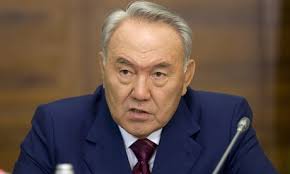 The government in Kazakhstan has set a rare precedent by backing down over the planned land sales that sparked off a wave of major protests across the country.
The government in Kazakhstan has set a rare precedent by backing down over the planned land sales that sparked off a wave of major protests across the country.
President Nursultan Nazarbayev announced on May 6 that he was imposing a moratorium on changes to the land code that were making the sales possible.
In a related development, National Economy Minister Yerbolat Dosayev, who has been tasked with explaining aspects of revised land legislation to the public, resigned his post.
Minor pickets in Astana and Almaty in April escalated into a major demonstrations in several cities all over Kazakhstan, badly spooking the authorities.
Amendments to the law approved in November extended the period for which farming land could be rented to foreigners from 10 to 25 years and set the terms for land auctions, open only to Kazakhstani citizens, to be held from July onward. Objections to these changes ranged from suspicions that long-term land leases to foreigners might in practice end up with renters becoming de facto owners to concerns that corrupt officials could pocket the proceeds of land rentals and sales.
While acknowledging defeat in this standoff against an increasingly disgruntled population, Nazarbayev sought to blame the tension on a misinformed general public.
“We should have explained to a misunderstanding people that there was no talk of selling farming land,” he said. “The people who should have been addressed didn’t understand the essence [of the land law amendment]. The mechanisms and norms of this law were not discussed with the public and the fears and concerns of the people were in many respects justified.”
Nazarbayev said that after consultations with the public, the moratorium on the land law could be either be lifted or left in place, depending on the outcome of the discussions. He also ordered that a government commission be set up to study the land issue further.
“I order that a commission be created under the chairmanship of deputy Prime Minister Bakytzhan Sagintayev. This commission will, together with state bodies and civil society groups, discuss this question and clarify the norms related to this high-profile matter,” he said.
While tendering his resignation during a government meeting presided by Nazarbayev, Dosayev insisted all the same that the land legislation was sound and needed.
“The new norms in the land code are indispensable and required, and correspond to international practice,” he said.
This climbdown represents a major concession for a government used to railroading decisions with either minimal or token public discussions.
The crucial question now is whether the moratorium will deal a definitive blow to the momentum of a protest movement that had threatened to evolve and encompass broader discontent about the government’s performance. Success in getting the authorities to reconsider its policies could potentially embolden a public that has been hit hard by the economic downturn of the past year and that has until now grumbled mostly privately about the punishing levels of corruption in the country.
By blaming the people for not understanding laws, Nazarbayev is hardly going to do much to soothe frayed tempers.
But if some lessons have been learned, it is more likely that others have not.
There is something paradoxical about seeing Nazarbayev refer to an issue being important and high-profile on the same state media that has signally ignored the recent wave of protests. In the rare instances when the rallies have been mentioned in state media, it has been to imply that they were being instigated by a foreign government.
The president grumbled about a “misunderstanding people,” although there are no strong reasons to believe he is likely to usher in conditions conducive to a robust, engaging, informative and inquisitive free media flourishing in Kazakhstan.
Also, it is not clear with which groups public consultations might take place. Conditions for legitimately independent nongovernment groups became considerably harder last year, when Nazarbayev approved legislation tightening the rules on financing for such organizations. Activists at the time complained that the legislation would grant the government “ideological control over the NGOs” — an outcome that can only have served to hinder clear lines of dialogue between the people and their rulers.
EurasiaNet.Org, 5.05.2016




